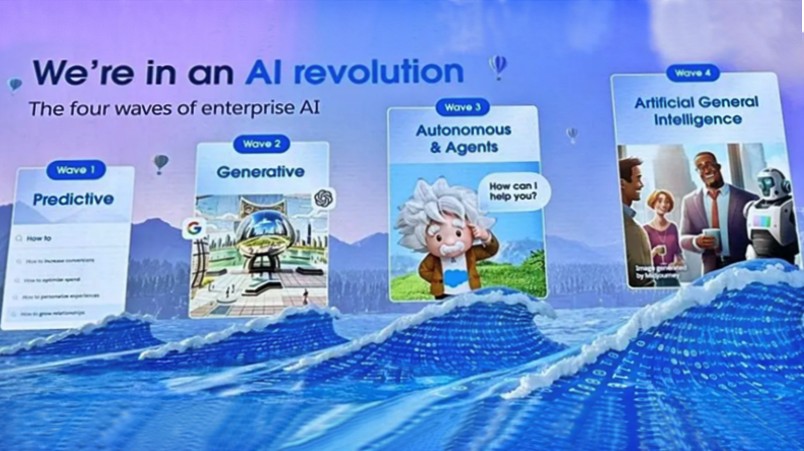AI ‘hallucinations are lies’: Salesforce boss Marc Benioff stakes claim for world’s biggest AI summit as CEOs reorder to top priority; trust, regulation splits industry

Lies, damn lies and linguistics: Open AI boss Sam Altman and Salesforce chief Marc Benioff not quite eye to AI on large language model 'hallucinations'.
There are “less than 10 million hard coders in the world” and AI will only go mainstream when “no code, low code” can work for the corporate masses and AI's penchant for making things up is controlled. These were the core themes hammered home to 40,000 delegates on the ground and “millions” streaming in this week for what used to be the world’s biggest tech vendor conference in San Francisco from Salesforce. The US$215bn “customer company” says its Dreamforce event has moved on – it is now the globe’s “biggest AI conference” but with an egalitarian twist and some hard advice from Peter Schwartz, a consultant on AI-laced sci-fi films like Minority Report and WarGames who joined the company in 2011 in strategy and futures. Australian execs at the gig say it might take six to 12 months and a rush of data investment – and regulatory hurdle jumping – before many local companies can tap AI’s promised land. But that only applies to those with their data in order – many still don't.
What you need to know:
- Salesforce has changed its Dreamforce mantra as the company goes all in on AI. The annual tech-led homage to “the customer” is now the world’s “biggest AI conference”, per CEO Marc Benioff.
- But Benioff is aiming to put some moral high ground between Salesforce and rival tech firms making money off their mutual customers’ data, seeking to lay down a marker on trust.
- He had an apparent crack at the likes of Google and Meta “using your data to make money”. Salesforce doesn’t and won’t do that, he claimed.
- Plus, Benioff took aim at the “lies” being fired out by large language models – and the data security concerns leading some firms to ban their use: All Salesforce’s cloud platforms – sales, customer service, marketing, data and beyond – would be restrained for the greater good of business and civics, he claimed.
- Australian digital aficionados at the event think firms plugged into Salesforce – those with their data in order – will be powering away from rivals due to AI within six to 12 months.
- Those that haven’t got the fundamental data infrastructure in place will fall behind fast, per the co-founder of Ogilvy's Bower House Digital, Bryan Dobson - Bower House was acquired by WPP ANZ last year as it ramps up its customer experience capabilities to compete with the likes of Deloitte and KPMG.
A lot of companies that you're partnering with, especially on the consumer side – you know how they operate … it is a well known secret that they're using your data to make money. That is not what we do at Salesforce. Your data isn’t our product. You control access to your data. We need some new standards.
AI overnight – not quite
Former New Zealand supermodel Rachel Hunter’s endlessly parodied “It won’t happen overnight but it will happen” tagline for P&G’s Pantene shampoo best sums up this week’s AI-drenched summit in San Francisco.
It was everywhere at Salesforce’s annual tech-led homage to “the customer” – embedded in dozens of Salesforce cloud product updates designed to make AI super friendly for those who can’t code, can’t prompt.
Even ESG compliance and reporting, another top headache for business, is now deep in AI’s dragnet at Salesforce.
Australian execs at the event, however, say there’s a few data and regulatory hurdles to clear before most local firms can tap the new frontier although the most advanced in their data infrastructure would land early wins – if they were somewhere in the Salesforce system.
While Salesforce boss Marc Benioff dealt his tech company all-in on AI this week, he fired some mighty warnings on its downside – and swipes at other tech companies whose fortunes are derived from capturing data from other companies and people.

Restraining, taming AI
Benioff didn’t name names but did probe and push in a fireside conversation with AI’s rockstar, Open AI CEO Sam Altman. Altman was in low-key defiance. Artificial intelligence 'hallucinations' (i.e. making stuff up) he said were a necessary trade-off for advancing the technology. Today, Altman joins Elon Musk and Mark Zuckerberg fronting the US Senate on the same themes of restraining, taming and reframing the inevitable rise of machine intelligence.
Interesting timing then that earlier in the day at Benioff’s typically fired-up annual keynote to thousands, he repeated the line “your data isn’t our product” – a growing fear among business and consumers as established big tech and fledgling AI startups seek to fill and inform their large language models [LLMs] with others' accessible data, prompting some firms to ban the use of ChatGTP and the like.
There is such a focus on privacy and compliance - that will be the biggest driver for organisations fixing their data.
Lies, not hallucinations
On that front, Benioff sought to lay down a marker on trust between his company and others in AI’s deployment across business, government and society. He publicly tackled the most contentious concerns around the rise of the machines and offered antidotes – a Salesforce “trust layer” embedded in its product updates that promised the uncoded and uninitiated with access, ease of use and tight data security.
All Salesforce’s cloud platforms – sales, customer service, marketing, data and beyond – would be restrained for the greater good of business and civics, he claimed.
“These things are good, but they're not great,” Benioff said. “You get a lot of answers that aren't exactly true. They call them hallucinations. I call it lies … and they can turn very toxic very quickly. Peter Schwartz is right here. He wrote Minority Report and WarGames. He understands. We know what can happen with AI when it goes really wrong.”
Benioff also seemingly squared up on Google and Facebook: “We're not here to take your data. We're not here to look at your data. We also know that this is a trust revolution … so for a lot of companies that you're dealing with … that you're partnering with, especially on the B2C side and on the consumer side – you know how they operate … it is a well known secret that they're using your data to make money. That is not what we do at Salesforce. Your data isn’t our product. You control access to your data," said Benioff. "We need some new standards.”
Low code, no code
And so Benioff continued, including the need for AI to be accessible and user-friendly for those not endowed with coding talent.
“You're also going to have to make [AI] available to non-programmers, not just hardline coders. There's less than 10 million hardline coders in the world. But the low coders and the no coders, and people who cannot programmatically put it all together – these are our trailblazers, these people are so important to make that happen. We've got to make this available in this low code, no code way. And we have to keep it open so that all of our partners and all of our ecosystem can participate in this AI revolution.”
Vice President and Principal Analyst at Constellation Research, Liz Miller, told Mi3 the public position from Salesforce was a brave move, given investors would be seeking maximum AI profits in the short-term from the firm versus a more-measured longer-term play. Benioff certainly didn’t hold back. “We are not afraid to say things that others are afraid to say,” he told delegates.
WPP vs KPMG vs Deloitte
More broadly, the big consulting firms have clocked lucrative new revenue lines in corporate customer transformation programs – KPMG and Deloitte, particularly, were out in force this week – they’re usually aligned to various tech company products like Salesforce, SAP, Adobe, Microsoft and Oracle.
The boom in corporate investment on customer experience management has also been noted by the big global communications holding companies, which have been investing and acquiring capabilities to diversify their traditional media, advertising and communications services.
WPP, for instance, is a global Salesforce “platinum partner” with upwards of 7,000 practitioners across the tech firm’s marketing, commerce, experience, loyalty, analytics, service and sales Clouds. This week, WPP’s agency network Ogilvy was the most visible among the holding company divisions. WPP’s ANZ unit last year acquired Bower House Digital, a year after it landed Salesforce’s APAC “Growth Partner of the Year” in 2021. At the time of WPP’s acquisition and its move into Ogilvy, Bower House designed and deployed digital experiences for the likes of Bunnings, Bupa, Aesop, Target and Myer. The firm also works with other vendors such as Telium and Braze.
Mass AI '6-12 months away'
Bower House + Ogivy co-founder Bryan Dobson, who was at Dreamforce this week, told Mi3 the swathe of AI announcements from Salesforce would see Australian firms most advanced in their data infrastructure and strategy move quickly to operationalise the new AI features.
“Australia pivoted so quickly during Covid – it was the biggest driver of transformation within an organisation in the history of technology. The transformations that were undertaken during that time were both operational technology, people and process and so if we can continue to transform with the same velocity, these new AI developments from Salesforce can all be achieved within a very short timeframe – six to 12 months.”
But for others in Australia, AI may be top-of-mind but unreachable until their tech systems are unified and data not stuck in various silos.
Privacy, compliance forcing unified data
Dobson said the biggest driver in overhauling and unifying tech and data systems for many Australian companies at present was privacy compliance, data security, and brand reputation fears over hefty fines from the Australian Competition and Consumer Commission.
“Everyone is focused on privacy at the moment with the data breaches that have occurred in Australia and compliance issues around that," he said. "There is such a focus on privacy and compliance - that will be the biggest driver for organisations fixing their data. I know organisations that don't even have the foundations right. So what Salesforce has announced is advanced AI functionality which can deliver substantial value – but [those companies] don't have the basics. They don't have that data right, they've not harmonised their data, it’s not available in real-time. And if you haven't got your data sorted, it’s shit in, shit out."
He suggested firms solve those basics fast, given the acceleration about to occur in AI.
"You can’t really do AI by virtue of non-compliant data. Those that have will see some very big gains, quickly.”



